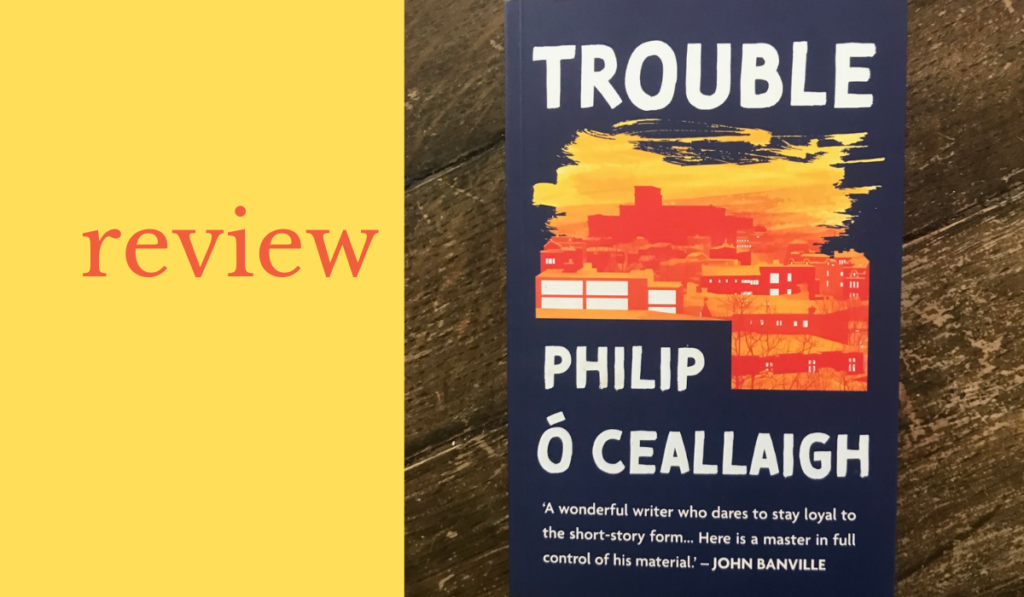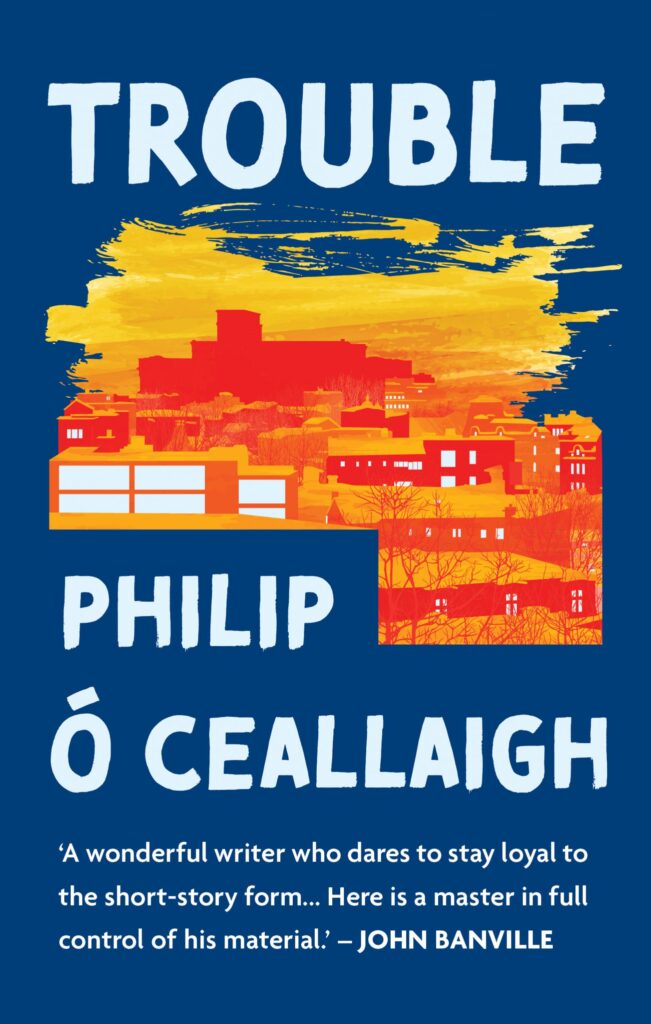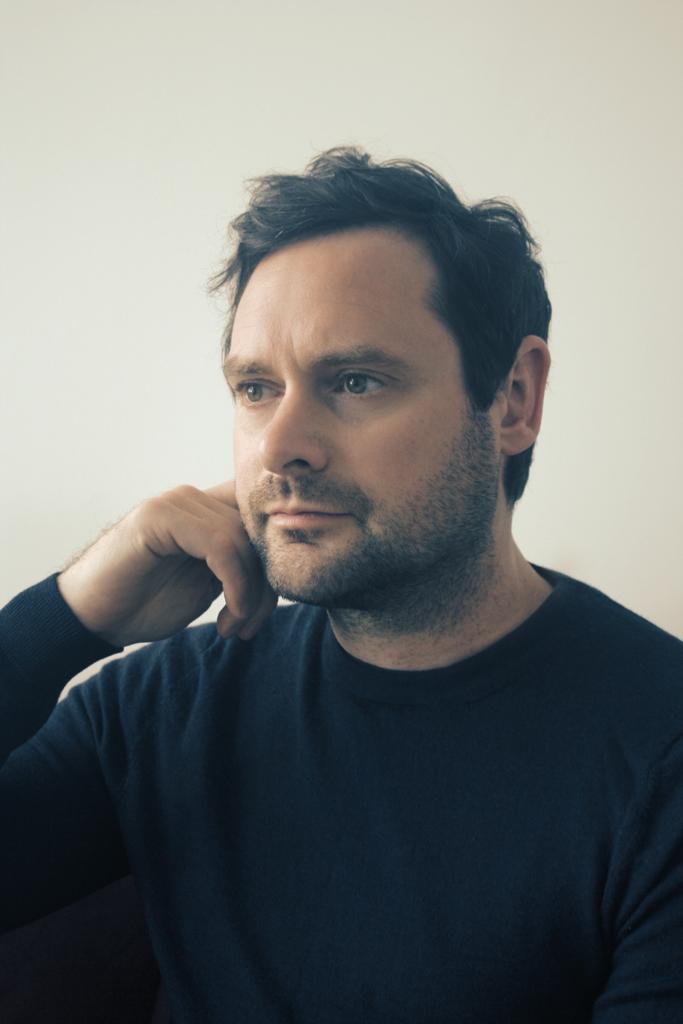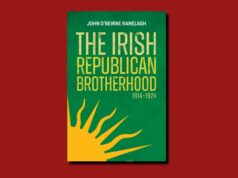
Trouble|Philip Ó Ceallaigh|The Stinging Fly Press|ISBN:978-1-906539-86-3|Cover design Catherine Gaffney|€15-€35
Ó Ceallaigh has kept his readers waiting for a decade for a new collection. The wait has been worth it.
by Eoghan Smith
We do not need the distillation of time to recognise that it has been a glorious few years for Irish short story writing.
Philip Ó Ceallaigh might quibble with the designation Irish writer. Ó Ceallaigh, who is 53, left Ireland when he was in his early twenties and has lived in Bucharest for twenty years. In an interview with the LA Review of Books he says that he’s not an Irish writer, in the sense that he’s not preoccupied with Ireland; he is much more engaged with Eastern Europe.
The stories in Trouble, Ó Ceallaigh’s third collection, are predominantly set in Bucharest, while also traversing Dublin, Waterford, Poland, Austria, and Italy. There is a Banvillian echo in Trouble in Ó Ceallaigh’s male narrators, who briefly glimpse – or at least think they can glimpse – some kind of authentic experience, or self-knowledge, or even plain old happiness that is just beyond their reach.
These are fundamentally solitary and frequently lonely people: an assortment of nearly-men whose lives are in hock to others; men who yearn for freedom and autonomy but end up the ‘spectators’ of their own lives.
Love and Trouble
Two words bind these stories together: love and trouble, the latter appearing regularly throughout. In ‘Trouble’, a security guard in Dublin rips off his underworld boss and then steals his girlfriend – apparently out of love – before fleeing and drifting aimlessly around the Balkans. The narrator is a something of a loner, a restless individual who both reads the mighty Russians, Tolstoy, Chekov and Gogol, and gets helplessly embroiled in the world of criminality.
Elsewhere, relationships are troubled: in the quirky ‘Graceland’, a loveless marriage is falling apart. For the hilariously self-involved, boozy, promiscuous screenwriter of the self-reflexive companion stories, ‘My Life in the City’ and ‘My Life in the Movies’, falling in love and getting into trouble – the kind of unsatisfactory love that gradually snips your thinly-attached and underappreciated freedom – are inextricable.
Transitory
The opening sentence of ‘Trouble’ – ‘I once owned a house in Bucharest’ – alerts the reader to a sense of transitoriness, of tangible things snatched out of time only for them to disappear. This sense of drift, of homelessness, of the arbitrariness of things, is both existential and spiritual.
In ‘Smoke’, a young man falls off his motorbike and, lying on the ground, experiences profound revelation:
“[I] discovered that I was a soul, and that time was just an obsession, a condition, of the body, and that thought itself, compulsive and time-bound, was the fault of the body… ”
And yet, the world has a tangibility in Ó Ceallaigh’s stories. In scrupulously depicted cityscapes, the fixed brutalist architecture of Communist-era Romania competes with the floating detritus of late capitalism. People are obsessed with and live among ordinary things.
Many of the stories explore the male desire for sex, which is presented as urgent, voracious, competitive and often exploitative.
The mundane rhythms and tasks of daily life are emphasised: eating, drinking, smoking, dealing with animals, managing and failing to manage families and relationships, the persistent need for work, the necessity of finding a home or even just a floor to sleep on.

Humour
Among these banalities and irritations, and amid the general sense of both entrapment and drift of his generally middle-aged men, Ó Ceallaigh finds enormous humour. This humour rescues Trouble from any sense of self-pity or overwrought introversion by inviting in the perspective of the absurd. In ‘My Life in the Movies’, the narrator, grumpily aware that his heyday has been and gone, turns his sardonic gaze on his younger, narcissistic rivals and their new onanistic world order:
“Around us, the new species of male that was invading the planet – skinny, blow-dried, finicky about attire and grooming. Aliens, hunched into the screens of laptops and hand-held devices, attentive as lovers, faces palely illumined in the hypnotic masturbatory glow.”
The many moments of barbed wit and dry observation – and Trouble is the funniest collection I have read since Sweeney’s Modern Times – are shockingly juxtaposed with the pitilessness of degeneration and death.
Breadth and vision
A number of stories in the collection demonstrate both the breadth of Ó Ceallaigh’s intellectual and philosophical range and the seriousness of his vision. ‘Deadbeat’ charts a day in the bitter relationship between an old man and his estranged son, focussing the reader’s eye on the dreadful process of physical deterioration and emotional embitterment, where life is referred to without sentiment as a ‘carnival of dissolution’.
This sense of bodily trouble is more gently explored in the poignant story ‘Spring’, which centres on a man trying to buy a run-down apartment for himself and his daughter. In the course of events, we are told that for a simple aging plumber, who fixes a leaking tap for the man, ‘wrestling decay is his hobby’. ‘Spring’, like so many stories here, is a subtle, quiet story, and handled with an extraordinarily deft feeling for human frailty.
Elsewhere, Ó Ceallaigh expands the lens. In the lengthier and frankly morally challenging ‘First Love’, a forlorn SS-man emotes profusely about his love for a woman as he recounts his daily hideous and brutal treatment of Jews. ‘First Love’, which is a fictional re-writing of the diaries of the real-life Nazi Felix Landau, on first reading may feel slightly out of place with the rest of the collection, because it is a piece of semi-historical reimagining based on the war-time diaries of a real person. Yet, it is of essentially thematically of a piece with the other stories in its exploration of love in the maddest and most deluded of its manifestations.
Ó Ceallaigh has kept his readers waiting for a decade for a new collection. The wait has been worth it.
Trouble is masterful. This book is the work of a meticulous writer who never lets that meticulousness show; though every precise sentence has been burnished until it sparkles, there is no lingering scent of sweat or polish, only the brilliant gleam of every word in each of the thirteen stories.

Eoghan Smith is the author of The Failing Heart (Dedalus 2018). His second novel, A Provincial Death, will be published by Dedalus in 2021.











